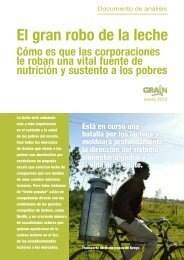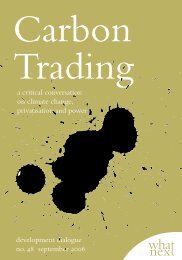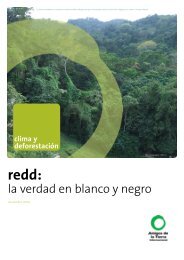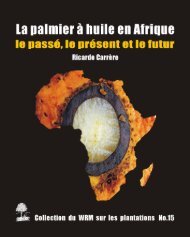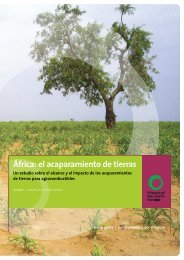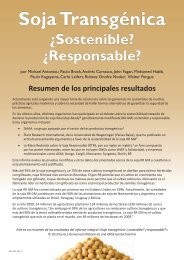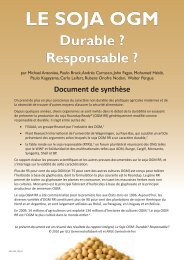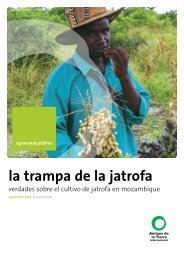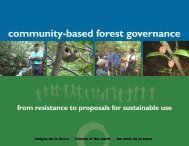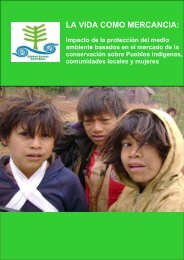Plantations, poverty and power - Critical Information Collective
Plantations, poverty and power - Critical Information Collective
Plantations, poverty and power - Critical Information Collective
Create successful ePaper yourself
Turn your PDF publications into a flip-book with our unique Google optimized e-Paper software.
16<br />
even public demonstrations against the plant.<br />
For example, before construction of Botnia’s pulp mill in Uruguay, the Government of Uruguay <strong>and</strong> the<br />
Government of Finl<strong>and</strong> signed an agreement “regarding the promotion <strong>and</strong> protection of investment”.<br />
This was in effect an agreement assuring Botnia of the Uruguayan Government’s constant support. The<br />
agreement even forces the government to pay compensation to Botnia for any losses, caused by, among<br />
other things, riots. 45 In 2006, the Uruguayan government sent police <strong>and</strong> the army to keep protesters away<br />
from the pulp mill building site, as a result of massive organised opposition in neighbouring Argentina,<br />
bringing back memories of the dictatorship for activists in Uruguay. 46<br />
In Indonesia the rapid expansion of the pulp industry during the 1990s was preceded by a series of studies<br />
funded by, among others, the World Bank <strong>and</strong> the Asian Development Bank. Subsidies <strong>and</strong> tax<br />
concessions, implemented under the Soeharto dictatorship, encouraged the establishment of hundreds of<br />
thous<strong>and</strong>s of hectares of industrial tree plantations. The result has been massive deforestation. Much of<br />
this was fraudulent: companies took the subsidies, logged the forest <strong>and</strong> did not establish plantations. 47<br />
Today, more than two decades after the pulp industry’s expansion in Sumatra was planned, there are not<br />
enough plantations to provide raw material to the pulp mills, which remain dependent on timber from<br />
Sumatra’s rapidly-shrinking rainforests. 48<br />
While production of pulp is moving South, much of the advice that governments, companies <strong>and</strong><br />
financiers rely on comes from northern-based consulting firms. Much of the financing for pulp <strong>and</strong> paper<br />
mills comes from the North. The machinery <strong>and</strong> equipment for pulp <strong>and</strong> paper machines is manufactured<br />
in the North. The manufacture <strong>and</strong> export of pulp <strong>and</strong> paper machinery is often backed by export credit<br />
<strong>and</strong> guarantee agencies.<br />
The expansion in the South is as much a factor of structural problems within the pulp industry, <strong>and</strong> the<br />
North’s “need” to exp<strong>and</strong> its industry <strong>and</strong> gain access to raw materials as it is a question of economics.<br />
Certainly, it has nothing to do with “development”.<br />
The pulp sector in Europe<br />
The pulp <strong>and</strong> paper sector in the North may not be exp<strong>and</strong>ing as fast as in Latin America or south-east<br />
Asia but the North still plays a large role in the industry. According to PricewaterhouseCoopers, more<br />
than three-quarters of the 100 biggest companies in the forestry, packaging <strong>and</strong> paper sector, are from<br />
North America, Europe <strong>and</strong> Japan. 27 have their headquarters in the US, 11 are from Canada, 26 are from<br />
Europe <strong>and</strong> 12 are from Japan. 49<br />
45 “Uruguay: Either with the people or with pulp mills <strong>and</strong> tree plantations”, World Rainforest Movement Bulletin no. 83,<br />
June 2004. http://www.wrm.org.uy/bulletin/83/Uruguay.html<br />
46 “Uruguay: Though not yet in operation, Metsa Botnia’s pulp mill already smells rotten”, World Rainforest Movement<br />
Bulletin no 113, December 2006. http://www.wrm.org.uy/bulletin/113/Uruguay.html<br />
47 The most notorious example is Bob Hasan, a close friend of Indonesian dictator Soeharto. Hasan was jailed for corruption<br />
after Suharto’s fall. Chris Lang (2006) “Indonesia: Deutsche Bank pulls out of UFS pulp project”, World Rainforest<br />
Movement Bulletin no. 102, January 2006. http://chrislang.org/2006/01/24/indonesia-deutsche-bank-pulls-out-of-ufs-pulpproject/<br />
48 See, for example, my post on Pulp Inc: “APP <strong>and</strong> APRIL still cannot legally supply their pulp mills”, 10 April 2008.<br />
http://pulpinc.wordpress.com/2008/04/10/app-<strong>and</strong>-april-still-cannot-legally-supply-their-pulp-mills/<br />
49 “Global Forest <strong>and</strong> Paper Industry Survey: 2006 Edition - Survey of 2005 Results”, PricewaterhouseCoopers, 2006.



